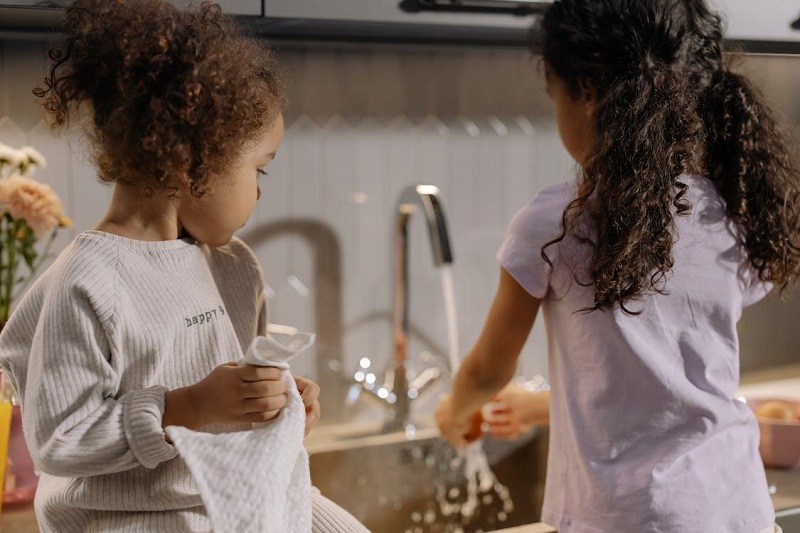Parenting
Helping Your Child Reset, Refresh, and Prepare for the Days Ahead
by Dana Brown
As parents, we want our children to grow up healthy and happy. While we focus on providing for their physical needs like food, shelter, and clothing, it’s equally important to prioritize their emotional and mental well-being. Today, Handwriting for Heroes explores some activities that can help kids reset, refresh, and prepare for the days ahead.

Image @ Pexels
Set a Consistent Bedtime Routine
A good night’s sleep is crucial for a child’s physical and mental growth, as it improves their mood and academic performance while reducing the risk of illnesses. A consistent bedtime routine that includes activities like reading a book or taking a warm bath helps your child wind down and prepare for sleep. Setting a fixed bedtime and wake-up time, even on weekends, can regulate their circadian rhythm and promote restful sleep.
Engage in Deep Breathing Exercises
Deep breathing exercises can help children manage anxiety, stress, and other overwhelming emotions. Moshi recommends teaching them to inhale deeply through their nose and exhale slowly through their mouth. You can use visual aids like bubbles or a pinwheel to make the exercise more fun and engaging. Encourage your child to practice deep breathing whenever they feel upset or overwhelmed, even when they don’t need it.
Teach Your Child the Importance of Cleaning
Let’s face it — for most of us, cleaning is a chore. But by putting in a little targeted effort, it doesn’t have to be as daunting as we think. And it goes without saying that an orderly environment can have a profound subconscious impact on how we feel. Teaching your child to put things away when they’re finished can be a big help, as well. You can even make a game out of it to help them engage.
Encourage Your Child to Eat a Variety of Healthy Foods
A healthy diet is critical for a child’s physical and mental well-being. Encourage your child to eat a variety of fruits, vegetables, whole grains, lean protein, and healthy fats. HealthifyMe suggests limiting their intake of processed foods, sugary snacks, and beverages. Involve them in meal planning and preparation to teach them good eating habits and increase their appreciation for healthy foods.
Encourage Physical Activity
Your child’s routine can be greatly enhanced by taking advantage of the wellness-focused amenities available in your apartment complex. While traditional gym equipment is often off-limits to younger children due to age restrictions, there are usually plenty of other options to explore. For instance, playing tennis on the apartment courts, hiking along designated complex trails, enjoying time on the playground, or taking a swim in the pool are excellent ways to teach your child about the importance of physical activity in a fun and engaging manner. These activities not only promote physical health but also contribute to emotional well-being.
You can also go for walks together. A walk score map is a great tool for finding pedestrian-friendly areas nearby. You can use these walks as time to connect while also building your child’s confidence in exploring the world around them.
Set Aside Time for Play
Play is an essential part of a child’s development and well-being. It helps them learn new skills, build social connections, and manage stress. Encourage your child to engage in unstructured playtime, which allows them to explore their creativity and imagination. Set aside time for outdoor activities like playing catch, bike riding, or going for a hike. Schedule playdates with friends or enroll them in recreational classes like dance, music, or art.
Build and Maintain Social Connections
Social connections are crucial for a child’s emotional and mental health. Encourage your child to build friendships and interact with peers in a positive, supportive environment. Help them develop social skills like active listening, empathy, and conflict resolution. Participate in family activities that promote bonding and communication, such as game nights, movie nights, or cooking together.
An innovative and creative way to nurture your child’s appreciation for their social connections is by encouraging them to use a free online card maker to create custom cards for their friends. This digital tool offers a broad selection of customizable templates, allowing your child to express their creativity and thoughtfulness. They can personalize these cards with their own photos, add unique text, and design something that truly represents their friendship.
This activity not only fosters a sense of creativity but also teaches them the value of personal gestures in maintaining and strengthening social bonds. As they engage in this process, children learn the importance of showing appreciation and care for their friends, which are essential components of a healthy social life.
Have Them Write Down Their Thoughts in a Journal
Journaling can be a powerful tool for self-reflection and self-expression. Encourage your child to write down their thoughts, feelings, and experiences in a journal or notebook. Provide prompts or questions to guide their writing, such as “What made me happy today?” or “What was challenging for me today?” Reading previous entries can help them track their progress and identify patterns in their emotions and behaviors.
Teaching self-care skills to your kids is a wonderful investment in their long-term health and well-being. By establishing healthy habits early on, you can help your child build resilience, manage stress, and develop positive relationships. Encourage them to stay active, explore their creativity, clean up as they go, eat more healthily, value their friendships, and engage in self-reflection through journaling. With your support and guidance, your child can learn to navigate life’s challenges with confidence and grace.




